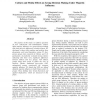Free Online Productivity Tools
i2Speak
i2Symbol
i2OCR
iTex2Img
iWeb2Print
iWeb2Shot
i2Type
iPdf2Split
iPdf2Merge
i2Bopomofo
i2Arabic
i2Style
i2Image
i2PDF
iLatex2Rtf
Sci2ools
110
click to vote
HICSS
2006
IEEE
2006
IEEE
Culture and Media Effects on Group Decision Making under Majority Influence
The purpose of this study is to address questions on how collectivistic and individualistic cultures affect majority influence in a group decision making task when there are differences in media richness. We developed a theory that explains and predicts these phenomena, and tested hypotheses using 112 fourperson groups that consisted of Chinese and U.S. participants. As predicted, we found strong evidence indicating that there were significant differences between Chinese and U.S. groups, with Chinese groups being more prone to follow the view of majority. Further, traditional face-to-face (FtF) unsupported groups experienced the strongest majority influence. We found that GSS use helped diminish majority influence in both Chinese and U.S. groups. These findings have broad theoretical and applied implications, which are discussed in this paper.
Biometrics | Cultures Affect Majority | HICSS 2006 | Majority Influence | Strongest Majority Influence | System Sciences |
Related Content
| Added | 11 Jun 2010 |
| Updated | 11 Jun 2010 |
| Type | Conference |
| Year | 2006 |
| Where | HICSS |
| Authors | Dongsong Zhang, Paul Benjamin Lowry, Xiaolan Fu |
Comments (0)

